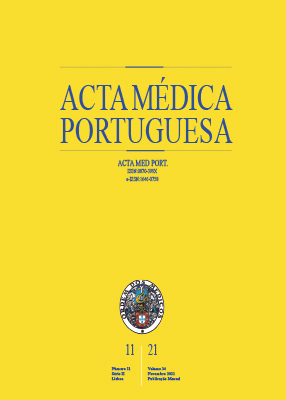Application of the 2015 Beers Criteria Operationalized for Portugal in Institutionalized Elderly: A Cross-Sectional Study
DOI:
https://doi.org/10.20344/amp.13030Keywords:
Aged, Inappropriate Prescribing, Institutionalization, Portugal, Potentially Inappropriate Medication ListAbstract
Introduction: The consumption of potentially inappropriate medicines is high among institutionalized elderly, predisposing to potential drug interactions, adverse drug events, risk of iatrogenic cascade, increased morbidity and mortality and health costs. Medication review is a promising strategy for therapeutic optimization, although scarcely documented in Portugal. The aim of this study was to characterize, using explicit criteria, the existence of potentially inappropriate medicines, among institutionalized elderly, and to calculate the eventual cost savings, with their discontinuation.
Material and Methods: Descriptive and cross-sectional study conducted in three residential homes for the elderly, from different geographic regions, based on a random sample of 33 health records. In order to characterize the existence of potentially inappropriate medicines, we used the 2015 Beers criteria, revised by the American Geriatrics Society and in the Portuguese version.
Results: On average, 11 drugs are prescribed to elderly residents of three residential structures for the elderly. All health records contain potentially inappropriate medicines (mean 4.8 ± 2.0 per resident), with anxiolytics (17.7%), antidepressants (17.7%) and antipsychotics (15.8%) being the most prevalent. Its reduction would result in an average monthly savings of €9.6 per resident.
Discussion: The consumption of potentially inappropriate medicines is higher than the literature describes, and the cost of medicines is high. The involvement of nurses in the process of drug management and reconciliation, in coordination with the physician, could be an effective strategy. This is the first study using the latest Portuguese version of the Beers criteria, which makes the comparability of the results difficult.
Conclusion: The consumption of potentially inappropriate medicines is high, which suggest the need for adoption of improvement measures.
Downloads
Downloads
Published
How to Cite
Issue
Section
License
Copyright (c) 2020 Acta Médica Portuguesa

This work is licensed under a Creative Commons Attribution-NonCommercial 4.0 International License.
All the articles published in the AMP are open access and comply with the requirements of funding agencies or academic institutions. The AMP is governed by the terms of the Creative Commons ‘Attribution – Non-Commercial Use - (CC-BY-NC)’ license, regarding the use by third parties.
It is the author’s responsibility to obtain approval for the reproduction of figures, tables, etc. from other publications.
Upon acceptance of an article for publication, the authors will be asked to complete the ICMJE “Copyright Liability and Copyright Sharing Statement “(http://www.actamedicaportuguesa.com/info/AMP-NormasPublicacao.pdf) and the “Declaration of Potential Conflicts of Interest” (http:// www.icmje.org/conflicts-of-interest). An e-mail will be sent to the corresponding author to acknowledge receipt of the manuscript.
After publication, the authors are authorised to make their articles available in repositories of their institutions of origin, as long as they always mention where they were published and according to the Creative Commons license.









